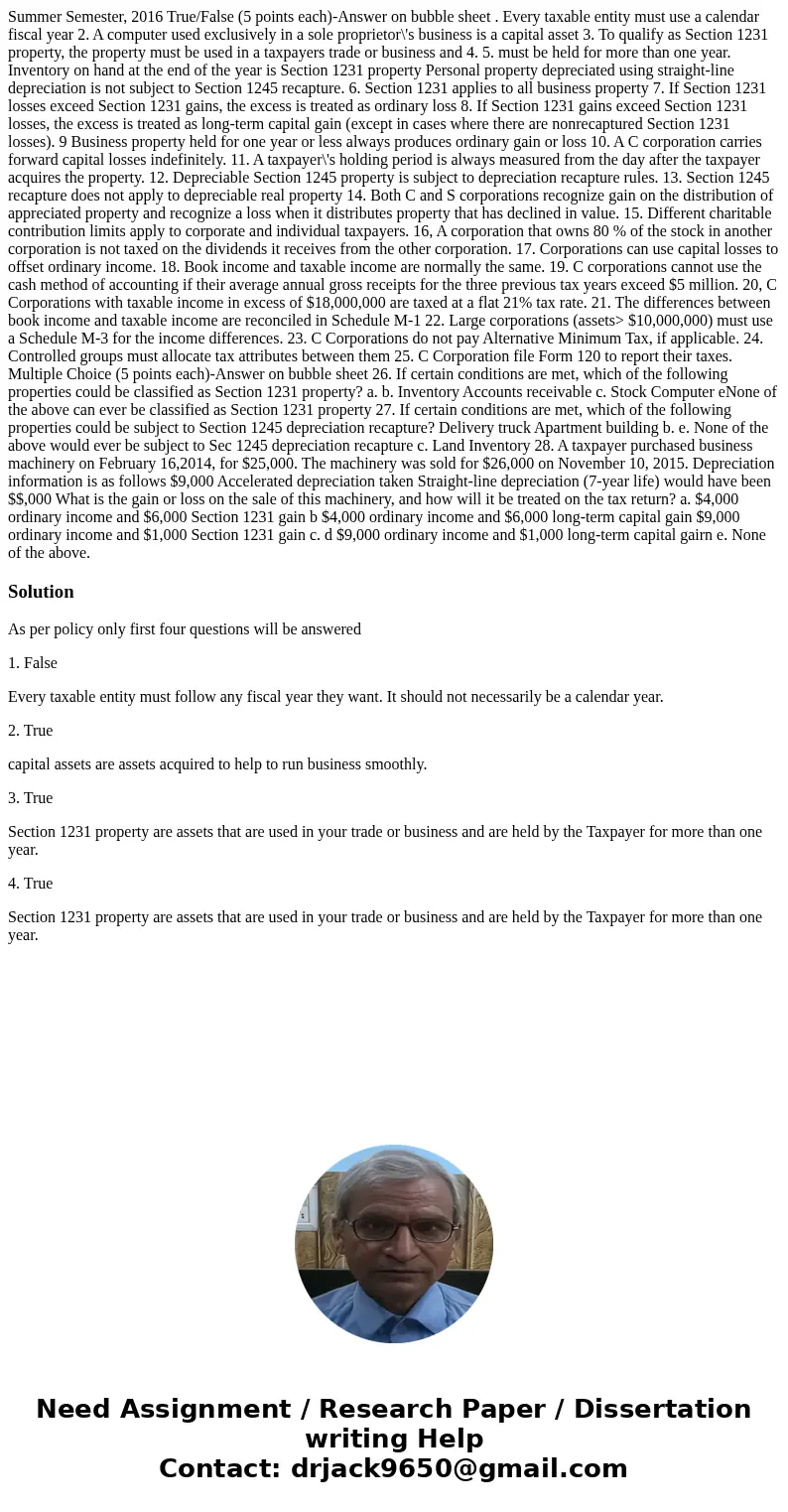Summer Semester 2016 TrueFalse 5 points eachAnswer on bubble
Summer Semester, 2016 True/False (5 points each)-Answer on bubble sheet . Every taxable entity must use a calendar fiscal year 2. A computer used exclusively in a sole proprietor\'s business is a capital asset 3. To qualify as Section 1231 property, the property must be used in a taxpayers trade or business and 4. 5. must be held for more than one year. Inventory on hand at the end of the year is Section 1231 property Personal property depreciated using straight-line depreciation is not subject to Section 1245 recapture. 6. Section 1231 applies to all business property 7. If Section 1231 losses exceed Section 1231 gains, the excess is treated as ordinary loss 8. If Section 1231 gains exceed Section 1231 losses, the excess is treated as long-term capital gain (except in cases where there are nonrecaptured Section 1231 losses). 9 Business property held for one year or less always produces ordinary gain or loss 10. A C corporation carries forward capital losses indefinitely. 11. A taxpayer\'s holding period is always measured from the day after the taxpayer acquires the property. 12. Depreciable Section 1245 property is subject to depreciation recapture rules. 13. Section 1245 recapture does not apply to depreciable real property 14. Both C and S corporations recognize gain on the distribution of appreciated property and recognize a loss when it distributes property that has declined in value. 15. Different charitable contribution limits apply to corporate and individual taxpayers. 16, A corporation that owns 80 % of the stock in another corporation is not taxed on the dividends it receives from the other corporation. 17. Corporations can use capital losses to offset ordinary income. 18. Book income and taxable income are normally the same. 19. C corporations cannot use the cash method of accounting if their average annual gross receipts for the three previous tax years exceed $5 million. 20, C Corporations with taxable income in excess of $18,000,000 are taxed at a flat 21% tax rate. 21. The differences between book income and taxable income are reconciled in Schedule M-1 22. Large corporations (assets> $10,000,000) must use a Schedule M-3 for the income differences. 23. C Corporations do not pay Alternative Minimum Tax, if applicable. 24. Controlled groups must allocate tax attributes between them 25. C Corporation file Form 120 to report their taxes. Multiple Choice (5 points each)-Answer on bubble sheet 26. If certain conditions are met, which of the following properties could be classified as Section 1231 property? a. b. Inventory Accounts receivable c. Stock Computer eNone of the above can ever be classified as Section 1231 property 27. If certain conditions are met, which of the following properties could be subject to Section 1245 depreciation recapture? Delivery truck Apartment building b. e. None of the above would ever be subject to Sec 1245 depreciation recapture c. Land Inventory 28. A taxpayer purchased business machinery on February 16,2014, for $25,000. The machinery was sold for $26,000 on November 10, 2015. Depreciation information is as follows $9,000 Accelerated depreciation taken Straight-line depreciation (7-year life) would have been $$,000 What is the gain or loss on the sale of this machinery, and how will it be treated on the tax return? a. $4,000 ordinary income and $6,000 Section 1231 gain b $4,000 ordinary income and $6,000 long-term capital gain $9,000 ordinary income and $1,000 Section 1231 gain c. d $9,000 ordinary income and $1,000 long-term capital gairn e. None of the above. 
Solution
As per policy only first four questions will be answered
1. False
Every taxable entity must follow any fiscal year they want. It should not necessarily be a calendar year.
2. True
capital assets are assets acquired to help to run business smoothly.
3. True
Section 1231 property are assets that are used in your trade or business and are held by the Taxpayer for more than one year.
4. True
Section 1231 property are assets that are used in your trade or business and are held by the Taxpayer for more than one year.

 Homework Sourse
Homework Sourse